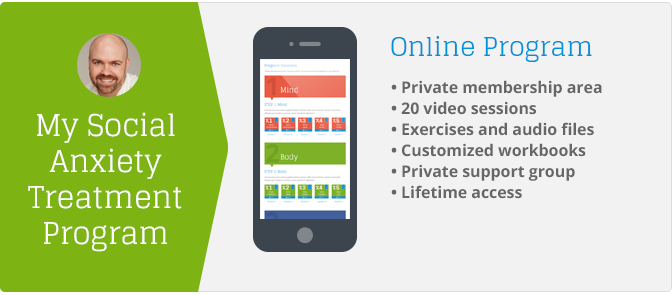How to Manage Social Anxiety at Work

If you have been diagnosed with Social Anxiety Disorder (commonly referred to as SAD), you may have decided to handle it, at some point or another, by avoiding the cause of your phobia: people. Giving up on the prospect of forming a meaningful relationship, declining invitations to parties, shying away from friendships, all this, and more, may well be part of your strategy to cope with it.
It makes for a lonely existence but you may feel that you can get away with it! However, there is one area of your life where there is no hiding and you have no choice but to confront the problem: work.
The office is one of the most challenging environments when it comes to coping with social anxiety. You will be judged on your performance by people who have authority over you, you may have to deal with conflict, you may be asked to speak in public, to which is added the requirement to socialise with your colleagues at work and at business events and functions.
Overcoming social anxiety at work, as difficult as it may sound, is nevertheless necessary. First of all, sad but true, this is where you will spend most of your adult life, so you might as well do everything you can to make it enjoyable and have friendly relationships with your co-workers. Then, in a world where collaboration and team work are highly valued skills, learning how to handle social anxiety at work will make the difference between climbing up the career ladder or not.
Everyday Work Interactions
Doing your job well is obviously instrumental to a successful career, but nowadays, “soft” skills, i.e. being a team player, being able to bring people together, networking, getting the most out of your colleagues through good relationships, have become at least as important, and this is where people suffering from social anxiety disorder at work are at a disadvantage and, unfortunately, can be passed over for a promotion when they are as capable as their coworkers.
Not only can it stop you from progressing professionally, but social anxiety disorder can also be misinterpreted as aloofness or unfriendliness and can isolate you, making it ever harder for you to find the confidence to get out of this vicious circle. But since you will spend most of your waking life in the office, it is worth investing some time in overcoming your social anxiety.

The key is to start small, and gradually challenge yourself out of your comfort zone. For example, don’t start with trying to approach a large, closely-knit group of colleagues who have worked together for years. Try to find people on their own by the water cooler, the photocopy machine, and if you think they look friendly, start a brief conversation. Asking them how they are, if they are busy etc… nothing too intense! As you get positive responses and you see that nothing awful is happening, you will find it easier to talk to more and more people.
Social Anxiety Affecting Work Duties
It may be that your social anxiety manifests itself only in a specific aspect of your job but in such a significant way that it is a serious problem.
A common occurrence is that of people who are reasonably confident otherwise but find it difficult to make phone calls, as the lack of body language triggers a latent phobia. If this the case, making notes about what you want to say will help you feel calmer.
An effective treatment method that you can practice at home involves making phone calls that are gradually more challenging, such as calling a business with a simple question such as their opening hours, then progress to a more complex issue, then do the same in front of one person, than a group of people.
Social Anxiety and Work Problems
Having to deal with problems at work, and potentially confronting people, is often stress inducing, even more so if you suffer from social anxiety. Whether this is a colleague or a line manager, the best plan is to make an appointment, or ask the person for a convenient time to talk to them, so that they are in the right frame of mind to listen to you. Then prepare what you want to say in advance, think about what they might say, and practice presenting your arguments as well as responding to theirs, making notes if you are worried about forgetting.
Of course, you can’t control everything, but it will help you feel more confident.
How to Deal with Social Anxiety at Work Meetings and Business Functions
Your instinctive response might be to arrive at the last minute so that you can avoid talking to people. However, by then, groups will have naturally formed and it will be much harder work to join in.
Counter-intuitively, the trick is, on the contrary, to arrive 10-15 minutes early. This way, you will be able to meet people as individuals and they will look less intimidating. It will also be easier to start a conversation and blend in a “unit” that will grow as more people arrive.
You shouldn’t feel that you need to be talking all the time, everybody likes a good listener, but if you worry about not having anything to say, make sure you watch the news in the preceding days and memorise a few interesting stories so that you can contribute to the conversation – but stay clear of controversial topics!
Whatever you do, don’t drink to calm your nerves. Alcohol might lower inhibitions, but having had too much to drink will be frowned upon in a business environment. Not only could it lead to developing a reliance on alcohol, which would only add to your issues, but it will also lead you to believe that you can’t cope with your social anxiety in the workplace on your own, and that you need rely on a prop, which is certainly not true.
Over time, through practice and by applying various strategies, you will notice that your levels of anxiety have decreased without the need for any substances.
You may have experienced “hyperfocus” at some point, that is thinking that everybody has noticed your difficulties, talks about you and judges you. An important aspect of your treatment is to remember that it is only your perception, and in all likelihood, nobody will think much more than that you are a bit shy. What might be more noticeable is your own reaction to your challenges, such as frustration for example.
In addition, we all tend to exaggerate other people’s confidence. Most of us are not half as self-assured as we pretend to be, some are just more skilled at hiding their nervousness – ever encountered someone who couldn’t stop joking?
In the end, a little bit of shyness and reserve is nothing bad. A lot of people will actually find it more appealing than you think, even in a business context.
How to Beat Social Anxiety at Work if You have to Give a Speech
Standing in front of everybody and having the whole room look at you and listen to you … If the thought makes you shiver, you might find some comfort in knowing that even some of the most seasoned CEOs, some of the biggest Hollywood stars dread it as much as you – and they are not even affected by social anxiety!
Like many other situations, you will feel much more relaxed if you are well prepared. Don’t rely on your memory, which is bound to fail you under stress, but prepare cards, notes, etc…, be confident about the information you are presenting and rehearse your speech… If possible, visit the room you are going to give your speech in in advance, climb on the stage or podium so that the location feels more familiar when the time comes.
If you are using any presentation aids, such as powerpoint slides, projectors, etc… make sure that you know how to operate them or that the people operating them have everything they need from you. Unexpected problems during your speech may destabilise you.
During your speech, find some friendly faces in the crowd and talk to them (without staring!) rather than to the whole room. It is easy to think of an anonymous crowd as judgmental, and remembering that you are actually facing a group of individuals, who are interested in what you have to say, and not a mob, should make you feel much more comfortable.
Here is a blog with some tips to help you manage social anxiety when giving a speech and another with some more tips about speaking in public
In Summary Then …
Managing social anxiety at work comes with its own set of specific challenges as you will have less control over the situations you are exposed to and more often than not, little choice about facing them. The key to overcoming your anxiety will lie in preparing yourself ahead of time, and using transferrable coping techniques. For example, tips for handling social anxiety at a party can be used at business events.
But most important of all: be patient with yourself. If you persevere, you WILL find it easier to cope with your social anxiety at work.
—
What do you find helps you cope with social anxiety at your work? I’d love to hear about it.
All the best, Kyle



Valeriy Elinskiy
night paws